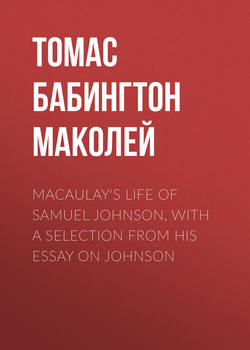Читать книгу Macaulay's Life of Samuel Johnson, with a Selection from his Essay on Johnson - Т.Б. Маколей, Томас Бабингтон Маколей - Страница 2
INTRODUCTION
II. MACAULAY AND HIS LITERARY CONTEMPORARIES
ОглавлениеThe very year in which the last volumes of Johnson's Lives of the Poets were published, 1781, Burns began to do his best work. In 1796 Burns died. In 1798, two years before Macaulay was born, Wordsworth and Coleridge published the first of the Lyrical Ballads, which included The Rime of the Ancient Mariner. Like Burns, yet in a way entirely his own, Wordsworth was the poet of Nature and of Man, and this little volume was the beginning of much spontaneous poetry which in the following years proved a refreshing change from the polished couplets which had been in fashion. Instead of Pope and Addison and Johnson, in whose time literary men cared more for books than for social reforms, more for manner than for matter, came Scott, Byron, Shelley, Coleridge, Landor, and Southey with their irrepressible originality.
Before Macaulay's day Defoe, Richardson, Fielding, and Smollett had each contributed something to the novel. During his lifetime came practically all of the best work of Miss Austen, Scott, Cooper, Lytton, Disraeli, Hawthorne, the Brontës, Dickens, Thackeray, Mrs. Gaskell, Trollope, and Kingsley. George Eliot's Adam Bede appeared the year he died.
Other prominent prose writers were Hallam, Grote, Milman, Froude, Mill, Ruskin, and Carlyle. In Memoriam and Mrs. Browning's Sonnets from the Portuguese were published in 1850, and Browning's The Ring and the Book came out in 1868.
As to Macaulay's relations with his literary contemporaries, it must be understood that he gave practically his whole attention to the times of which he read and wrote, and to the men who made those times interesting. Scientists were making important discoveries day by day, but his concern was not with them, even at a time when Darwin was writing his Origin of Species. It was not clear to him that philosophical speculations like Carlyle's might do much to better the condition of humanity. He finished Wordsworth's Prelude only to be disgusted with "the old flimsy philosophy about the effect of scenery on the mind" and "the endless wildernesses of dull, flat, prosaic twaddle." Although he read an infinite variety of contemporary literature he said he would not attempt to dissect works of imagination. In 1838, when Napier wished him to review Lockhart's Life of Scott for the Edinburgh Review, he replied that he enjoyed many of Scott's performances as keenly as anybody, but that many could criticise them far better. He added: "Surely it would be desirable that some person who knew Sir Walter, who had at least seen him and spoken with him, should be charged with this article. Many people are living who had a most intimate acquaintance with him. I know no more of him than I know of Dryden or Addison, and not a tenth part so much as I know of Swift, Cowper, or Johnson."17 He turned instinctively to the old books, the books that he had read again and again: to Homer, Aristophanes, Horace, Herodotus, Addison, Swift, Fielding. There was at least one writer of fiction in his time to whom he was always loyal. On one occasion when he had been reading Dickens and Pliny and Miss Austen at the same time, he declared that Northanger Abbey, although "the work of a girl," was in his opinion "worth all Dickens and Pliny together."
What he did for humanity he did as a practical man of affairs, at home alike in the Cabinet and in popular assemblies. While Carlyle in the midst of his gloomy life was toiling heroically to banish shams and to get at the True, the Real, Macaulay, who was reasonably satisfied with the past and the present, and hopeful of the future, was sifting from his vast treasury of information about the past what he believed to be significant in history and important in literature. He had none of the feeling that Ruskin had, that it was his duty to turn reformer, but what he did toward educating his readers he did in the way he most enjoyed.
17
Trevelyan, II, 15.
